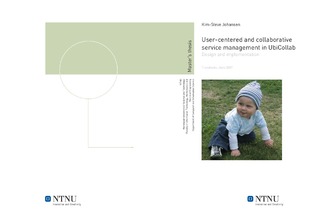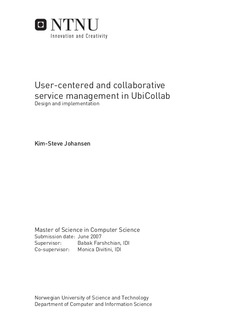| dc.contributor.advisor | Farshchian, Babak | nb_NO |
| dc.contributor.advisor | Divitini, Monica | nb_NO |
| dc.contributor.author | Johansen, Kim-Steve | nb_NO |
| dc.date.accessioned | 2014-12-19T13:31:52Z | |
| dc.date.available | 2014-12-19T13:31:52Z | |
| dc.date.created | 2010-09-03 | nb_NO |
| dc.date.issued | 2007 | nb_NO |
| dc.identifier | 347520 | nb_NO |
| dc.identifier | ntnudaim:3457 | nb_NO |
| dc.identifier.uri | http://hdl.handle.net/11250/250520 | |
| dc.description.abstract | This project has been carried out as a contribution to the UbiCollab project. The project aims to provide a platform for the support of ubiquitous collaboration. UbiCollab tries to support collaboration in the users' natural environment, and draws upon research in areas such as user mobility and ubiquitous computing to achieve this. The platform provides functionality such as location-awareness, integration with the physical environment and mobility support. UbiCollab is based on service oriented architecture (SOA), and integration of computerized services and service management are key aspects of the platform. A previous pre-study has been performed by this author in the autumn of 2006 to compile a set of requirements and propose an architecture for a user-centered and collaborative service management system. This work builds on that study, and provides the design and implementation of a service management system for UbiCollab. The system aims to provide users with the tools to effortlessly discover, provide, and consume services. Users will also be able to take advantage of new services as they become available in dynamically changing environments. Work done on the service management system consists of the design and implementation of several platform components and their application programming interfaces (APIs). In addition a set of applications to test the flexibility and functionality of the platform, as well as the completeness of the APIs, have been designed and implemented. What sets the service management system in UbiCollab apart from similar systems is the focus on end-users and collaboration. User-friendliness is achieved by creating a pluggable service discovery system where the inherent complexity of service discovery protocols are hidden from the user. In addition discovery of services by pointing at the service of interest with an RFID device is supported. The use of pointing provides a natural way of communicating. Collaboration is supported by allowing users to share their services (publish) in defined groups, and consume services shared by other users. | nb_NO |
| dc.language | eng | nb_NO |
| dc.publisher | Institutt for datateknikk og informasjonsvitenskap | nb_NO |
| dc.subject | ntnudaim | no_NO |
| dc.subject | SIF2 datateknikk | no_NO |
| dc.subject | Program- og informasjonssystemer | no_NO |
| dc.title | User-centered and collaborative service management in UbiCollab: Design and implementation | nb_NO |
| dc.type | Master thesis | nb_NO |
| dc.source.pagenumber | 140 | nb_NO |
| dc.contributor.department | Norges teknisk-naturvitenskapelige universitet, Fakultet for informasjonsteknologi, matematikk og elektroteknikk, Institutt for datateknikk og informasjonsvitenskap | nb_NO |

